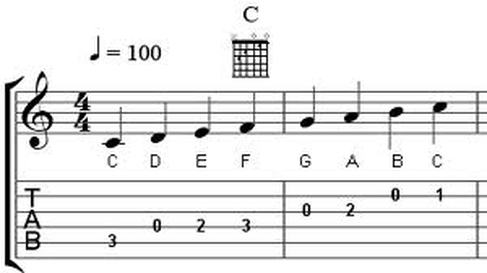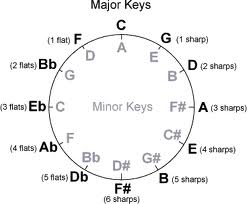
The Building Blocks of Music

A musical scale is an organized group of pitches that form a particular type of sound. For example, a Major Scale usually creates a happy sound and a Minor Scale creates a kind of sad sound.
Scales are like the building blocks of music. When you look at a house, you don't see the building blocks. That's because they are hidden behind the siding, or bricks, or stones that make up the esthetic qualities of the house. Every house looks different on the outside because of the different shapes, colors, sizes, and materials. But they all have building blocks made up of cement or concrete in the foundation and the frame of the house.

The Family Analogy

The Major Scale Family, has 12 members and they each have their own name and spelling. In music, the members are what we call “keys.” Here is a list of all 12 keys (members of the Major Scale Family):
All 12 Major Scale Keys (Members of the Major Scale Family)

- A Major
- Bb Major (or A# Major)
- B Major
- C Major
- Db Major (or C# Major)
- D major
- Eb Major (or D# Major)
- E Major
- 9. F Major
- Gb Major (or F# Major)
- G Major
- Ab Major (or G# Major)
Let's continue with the family analogy. Let's say your family member name is John Smith. Well, there is a spelling for the member name John Smith. It's J-O-H-N-S-M-I-T-H. That's how you spell the name. The same is true when “spelling” each Major Scale. For example, here is how you would spell a C Major Scale: C-D-E-F-G-A-B-C. These are the letters for how you spell the C Major Scale. Instead of letters, we use the word “notes” in music. These letters (notes), relate to each pitch in the scale.
Every scale has it's own unique spelling, just like different names have their own unique spellings.
Scale Family Chart
| Family Name = Major Scale Member of Family = C Major Scale Spelling: C-D-E-F-G-A-B-C Here's another example: Family Name= Major Scale Member of Family = A Major Scale Spelling = A-B-C#-D-E-F#-G#-A Another example: Family Name = Minor Scale Member of Family = C Minor Scale Spelling = C-D-Eb-F-G-Ab-Bb-C | Family Name = Smith Member of Family = Chris Spelling = C-H-R-I-S-S-M-I-T-H Family Name = Smith Member of Family = Anne Spelling = A-N-N-E-S-M-I-T-H Family Name = Rogers Member of Family = Chris Spelling = C-H-R-I-S-R-O-G-E-R-S |
Did you notice the 3rd example? The family name was different. It was Rogers. If you notice the corresponding musical family name, it says Minor Scale. This is a totally different family of scale with it's own sound qualities.
This is the basic concept of scales. Now learning exactly how to spell all the scales is a topic for another discussion.
The Benefits of Learn Scales
- You'll be able to learn new songs faster
- You'll be able to “hear” the music better with a newfound depth
- You'll understand how music “works”
- You'll increase your technical ability on your instrument and play with more fluency
- You'll no longer be overwhelmed by the complexity of your instrument
 RSS Feed
RSS Feed